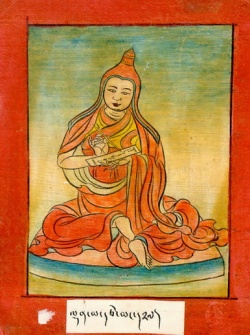Difference between revisions of "Parikuppa Sutta: In Agony"
(Created page with "{{DisplayImages|1757|2255}} {{Centre|AN 5.129<br/> <big><big>Parikuppa Sutta: In Agony</big></big><br/> translated from the Pali by<br/> Thanissaro Bhikkhu<br/> © 1997}}<br/>...") |
|||
| (One intermediate revision by one other user not shown) | |||
| Line 1: | Line 1: | ||
| − | {{DisplayImages|1757 | + | {{DisplayImages|1757}} |
{{Centre|AN 5.129<br/> | {{Centre|AN 5.129<br/> | ||
<big><big>Parikuppa Sutta: In Agony</big></big><br/> | <big><big>Parikuppa Sutta: In Agony</big></big><br/> | ||
| Line 6: | Line 6: | ||
© 1997}}<br/><br/> | © 1997}}<br/><br/> | ||
| − | :'''Translator's note''': ''This discourse lists the five grave deeds that are said to prevent one's chances of attaining any of the noble attainments in this lifetime. People who commit them fall — immediately at the moment of death — into hell. No help from outside is able to mitigate the sufferings they will endure in hell, and thus they are said to be incurable. Only when the results of these deeds have worked themselves out will they be released from hell. Even if they return to the human plane, they will continue to suffer the consequences of their deeds. For example, Ven. Moggallana, one of the Buddha's foremost disciples, killed his parents many aeons ago, and the results of that deed pursued him even through his final lifetime, when he was beaten to death. | + | :'''Translator's note''': ''This {{Wiki|discourse}} lists the five grave [[deeds]] that are said to prevent one's chances of [[attaining]] any of the [[noble]] [[attainments]] in this [[lifetime]]. [[People]] who commit them fall — immediately at the [[moment]] of [[death]] — into [[hell]]. No help from outside is able to mitigate the [[sufferings]] they will endure in [[hell]], and thus they are said to be incurable. Only when the results of these [[deeds]] have worked themselves out will they be released from [[hell]]. Even if they return to the [[human]] plane, they will continue to [[suffer]] the {{Wiki|consequences}} of their [[deeds]]. For example, Ven. [[Moggallana]], one of the [[Buddha's]] foremost [[disciples]], killed his [[parents]] many [[aeons]] ago, and the results of that [[deed]] pursued him even through his final [[lifetime]], when he was beaten to [[death]]. |
| − | "There are these five inhabitants of the states of deprivation, inhabitants of hell, who are in agony & incurable. Which five? One who has killed his/her mother, one who has killed his/her father, one who has killed an arahant, one who — with a corrupted mind — has caused the blood of a Tathagata to flow, and one who has caused a split in the Sangha. These are the five inhabitants of the states of deprivation, inhabitants of hell, who are in agony & incurable." | + | "There are these five inhabitants of the states of deprivation, inhabitants of [[hell]], who are in agony & incurable. Which five? One who has killed his/her mother, one who has killed his/her father, one who has killed an [[arahant]], one who — with a corrupted [[mind]] — has [[caused]] the {{Wiki|blood}} of a [[Tathagata]] to flow, and one who has [[caused]] a split in the [[Sangha]]. These are the five inhabitants of the states of deprivation, inhabitants of [[hell]], who are in agony & incurable." |
{{R}} | {{R}} | ||
Latest revision as of 06:05, 9 March 2015
AN 5.129
Parikuppa Sutta: In Agony
translated from the Pali by
Thanissaro Bhikkhu
© 1997
- Translator's note: This discourse lists the five grave deeds that are said to prevent one's chances of attaining any of the noble attainments in this lifetime. People who commit them fall — immediately at the moment of death — into hell. No help from outside is able to mitigate the sufferings they will endure in hell, and thus they are said to be incurable. Only when the results of these deeds have worked themselves out will they be released from hell. Even if they return to the human plane, they will continue to suffer the consequences of their deeds. For example, Ven. Moggallana, one of the Buddha's foremost disciples, killed his parents many aeons ago, and the results of that deed pursued him even through his final lifetime, when he was beaten to death.
"There are these five inhabitants of the states of deprivation, inhabitants of hell, who are in agony & incurable. Which five? One who has killed his/her mother, one who has killed his/her father, one who has killed an arahant, one who — with a corrupted mind — has caused the blood of a Tathagata to flow, and one who has caused a split in the Sangha. These are the five inhabitants of the states of deprivation, inhabitants of hell, who are in agony & incurable."
Source
"Parikuppa Sutta: In Agony" (AN 5.129), translated from the Pali by Thanissaro Bhikkhu. Access to Insight (Legacy Edition), 3 July 2010, http://www.accesstoinsight.org/tipitaka/an/an05/an05.129.than.html .
